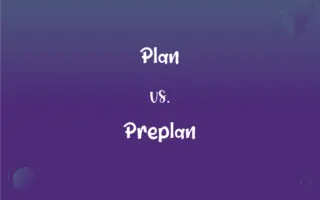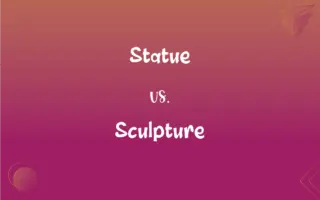Rhetoric vs. Argument: What's the Difference?
Edited by Aimie Carlson || By Janet White || Published on November 27, 2023
Rhetoric pertains to the art of persuasive speaking or writing, while an Argument presents a series of reasons to persuade someone of a conclusion.

Key Differences
Rhetoric encompasses a broad realm, focused on effective and impactful communication. It's an art and technique that plays with language, tone, style, and structure to persuade or inform. Rhetoric isn't limited to any particular content; instead, it's about how the content is conveyed, aiming for maximum influence and engagement.
On the other hand, an Argument is a structured series of statements designed to support a particular conclusion. It consists of premises leading to a conclusion, often presented logically. Arguments aim to convince the audience of the validity of a particular stance or viewpoint through reasoning.
While Rhetoric utilizes tools like ethos, pathos, and logos to engage audiences, its primary purpose isn't always to convince. Sometimes, Rhetoric aims to evoke emotions, entertain, or simply inform. It's the larger umbrella under which various forms of communication, including argumentation, exist.
Conversely, an Argument is more focused. Its main goal is to persuade through structured reasoning. When one presents an Argument, they use evidence, facts, and logic to support a specific claim or conclusion. While Arguments can and often do employ Rhetoric to be more convincing, their foundation is built on logical coherence.
Comparison Chart
Definition
The art of effective or persuasive speaking or writing.
A reason or series of reasons presented to support an idea.
ADVERTISEMENT
Purpose
To persuade, inform, or entertain using language effectively.
To convince or persuade using logical reasoning.
Components
Tools like ethos, pathos, and logos.
Premises leading to a conclusion.
Scope
Broad; encompasses various forms of communication.
Specific; focused on structured reasoning.
Emphasis
How something is said or written.
What is being said and the reasons behind it.
Rhetoric and Argument Definitions
Rhetoric
Skill in using language to persuade or influence.
Politicians often use Rhetoric to win over voters.
ADVERTISEMENT
Argument
A reason given in proof or rebuttal.
She provided a compelling Argument for the new policy.
Rhetoric
The study of principles and rules of composition.
She studied Rhetoric in college to become a more persuasive writer.
Argument
A discussion where differing opinions are asserted.
The two scholars had a lively Argument about the theory.
Rhetoric
Expressions intended more to impress than to be genuine.
Some felt his speech was pure Rhetoric with little substance.
Argument
A mathematical expression indicating a relationship of equality.
In trigonometry, the Argument of a function is an angle.
Rhetoric
Techniques employed to make speech or writing impactful.
The Rhetoric in the speech was filled with emotional appeals.
Argument
A discussion in which the parties involved express disagreement with one another; a debate
Philosophical arguments over the nature of existence.
Rhetoric
The art or study of using language effectively and persuasively.
Argument
An angry discussion involving disagreement among the participants; a quarrel
The roommates had an argument about whose turn it was to wash the dishes.
Rhetoric
A treatise or book discussing this art.
Argument
(Archaic) A reason or matter for dispute or contention
"sheath'd their swords for lack of argument" (Shakespeare).
Rhetoric
Skill in using language effectively and persuasively.
Argument
A course of reasoning aimed at demonstrating truth or falsehood
Presented a strong argument for the arts in education.
Rhetoric
A style of speaking or writing, especially the language of a particular subject
Fiery political rhetoric.
Argument
A fact or statement put forth as proof or evidence; a reason
The current low mortgage rates are an argument for buying a house now.
Rhetoric
Language that is elaborate, pretentious, insincere, or intellectually vacuous
His offers of compromise were mere rhetoric.
Argument
A set of statements in which one follows logically as a conclusion from the others.
Rhetoric
Verbal communication; discourse.
Argument
A summary or short statement of the plot or subject of a literary work.
Rhetoric
Synonym of rhetorical.
Argument
A topic; a subject
"You and love are still my argument" (Shakespeare).
Rhetoric
The art of using language, especially public speaking, as a means to persuade.
Argument
(Logic) The minor premise in a syllogism.
Rhetoric
Meaningless language with an exaggerated style intended to impress.
It’s only so much rhetoric.
Argument
The independent variable of a function.
Rhetoric
The art of composition; especially, elegant composition in prose.
Argument
The angle of a complex number measured from the positive horizontal axis.
Rhetoric
Oratory; the art of speaking with propriety, elegance, and force.
Argument
(Computers) A value used to evaluate a procedure or subroutine.
Rhetoric
Hence, artificial eloquence; fine language or declamation without conviction or earnest feeling.
Argument
(Linguistics) A word, phrase, or clause in a semantic relation with a word or phrase and that helps complete the meaning of that word or phrase, such as a noun phrase that is the object of a verb. The clause that we go is an argument of the verb suggest in the sentence I suggest that we go.
Rhetoric
Fig. : The power of persuasion or attraction; that which allures or charms.
Sweet, silent rhetoric of persuading eyes.
Argument
A fact or statement used to support a proposition; a reason.
Rhetoric
Using language effectively to please or persuade
Argument
A series of propositions organized so that the final proposition is a conclusion which is intended to follow logically from the preceding propositions, which function as premises.
Rhetoric
High flown style; excessive use of verbal ornamentation
Argument
(countable) A process of reasoning; argumentation.
Rhetoric
Loud and confused and empty talk;
Mere rhetoric
Argument
(countable) An abstract or summary of the content of a literary work such as a book, a poem or a major section such as a chapter, included in the work before the content itself; (figuratively) the contents themselves.
Rhetoric
Study of the technique and rules for using language effectively (especially in public speaking)
Argument
(countable) A verbal dispute; a quarrel.
The neighbours got into an argument about the branches of the trees that extended over the fence.
Rhetoric
The art of effective communication.
His Rhetoric was so compelling that everyone was captivated.
Argument
Any dispute, altercation, or collision.
Steve got in a physical argument with his neighbor and came away with a black eye.
While biking home, he got in an argument with the pavement.
Argument
Any of the phrases that bears a syntactic connection to the verb of a clause.
Argument
The independent variable of a function.
Argument
The phase of a complex number.
Argument
A quantity on which the calculation of another quantity depends.
The altitude is the argument of the refraction.
Argument
A value, or a reference to a value, passed to a function.
Parameters are like labelled fillable blanks used to define a function whereas arguments are passed to a function when calling it, filling in those blanks.
Argument
A parameter at a function call; an actual parameter, as opposed to a formal parameter.
Argument
A matter in question; a business in hand.
Argument
The subject matter of an artistic representation, discourse, or writing; a theme or topic.
Argument
Evidence, proof; (countable) an item of such evidence or proof.
Argument
To put forward as an argument; to argue.
Argument
To adduce evidence, to provide proof.
Argument
Proof; evidence.
There is.. no more palpable and convincing argument of the existence of a Deity.
Why, then, is it made a badge of wit and an argument of parts for a man to commence atheist, and to cast off all belief of providence, all awe and reverence for religion?
Argument
A reason or reasons offered in proof, to induce belief, or convince the mind; reasoning expressed in words; as, an argument about, concerning, or regarding a proposition, for or in favor of it, or against it.
Argument
A process of reasoning, or a controversy made up of rational proofs; argumentation; discussion; disputation.
The argument is about things, but names.
Argument
The subject matter of a discourse, writing, or artistic representation; theme or topic; also, an abstract or summary, as of the contents of a book, chapter, poem.
You and love are still my argument.
The abstract or argument of the piece.
[Shields] with boastful argument portrayed.
Argument
Matter for question; business in hand.
Sheathed their swords for lack of argument.
Argument
The quantity on which another quantity in a table depends; as, the altitude is the argument of the refraction.
Argument
The independent variable upon whose value that of a function depends.
Argument
To make an argument; to argue.
Argument
A fact or assertion offered as evidence that something is true;
It was a strong argument that his hypothesis was true
Argument
A contentious speech act; a dispute where there is strong disagreement;
They were involved in a violent argument
Argument
A discussion in which reasons are advanced for and against some proposition or proposal;
The argument over foreign aid goes on and on
Argument
A summary of the subject or plot of a literary work or play or movie;
The editor added the argument to the poem
Argument
A variable in a logical or mathematical expression whose value determines the dependent variable; if f(x)=y, x is the independent variable
Argument
A series of statements leading to a conclusion.
His Argument was clear, concise, and convincing.
Argument
The main statement in a piece of writing.
The primary Argument of the essay is well-supported.
FAQs
Is every Argument an example of Rhetoric?
While not every Argument employs Rhetoric, effective Arguments often use Rhetoric to be more persuasive.
Which ancient philosopher is known for his teachings on Rhetoric?
Aristotle is widely known for his foundational teachings on Rhetoric.
Why is an Argument used?
An Argument is used to convince or persuade using structured reasoning.
What is the main goal of Rhetoric?
Rhetoric aims to persuade, inform, or entertain using language effectively.
What components are essential for a valid Argument?
A valid Argument requires clear premises that logically lead to a conclusion.
Can Rhetoric be misleading?
Yes, Rhetoric can sometimes be used to manipulate or deceive, emphasizing form over substance.
What's a fallacious Argument?
A fallacious Argument contains flawed reasoning, making its conclusion unreliable.
Can Rhetoric exist without an Argument?
Yes, Rhetoric can exist purely to inform or entertain, without a structured Argument.
How does Rhetoric influence public speaking?
Rhetoric enhances public speaking by making it more impactful, persuasive, and engaging.
Why is structure important in an Argument?
Structure ensures that an Argument's premises coherently and logically lead to its conclusion.
Can Rhetoric be visual?
Yes, Rhetoric can be visual, such as in advertisements, where images are used persuasively.
What differentiates a strong Argument from a weak one?
A strong Argument is logical, well-supported, and coherent, while a weak one lacks evidence or contains fallacies.
Can an Argument be emotional?
Yes, while Arguments are based on logic, they can appeal to emotions to be more persuasive.
How do ethos, pathos, and logos relate to Rhetoric?
Ethos, pathos, and logos are Rhetoric tools representing credibility, emotion, and logic, respectively.
About Author
Written by
Janet WhiteJanet White has been an esteemed writer and blogger for Difference Wiki. Holding a Master's degree in Science and Medical Journalism from the prestigious Boston University, she has consistently demonstrated her expertise and passion for her field. When she's not immersed in her work, Janet relishes her time exercising, delving into a good book, and cherishing moments with friends and family.
Edited by
Aimie CarlsonAimie Carlson, holding a master's degree in English literature, is a fervent English language enthusiast. She lends her writing talents to Difference Wiki, a prominent website that specializes in comparisons, offering readers insightful analyses that both captivate and inform.






































































